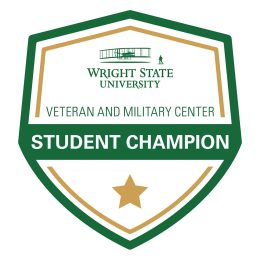 Wright State University’s Veteran and Military Center has initiated a new training regimen to assist veteran and military-connected students and aid others on campus.
Wright State University’s Veteran and Military Center has initiated a new training regimen to assist veteran and military-connected students and aid others on campus.
In September the center began offering a VMC Student Champion co-curricular certification to faculty, staff and students.
Seth Gordon, Ph.D., director of the Veteran and Military Center, said the program, inspired by the university’s Mental Health Task Force, incorporates VMC-sponsored trainings with other offices and services to ensure that those seeking to work with veterans have at least 15 hours of training in four areas.
The training exposes participants to student-led training on military culture, “Green Zone” training that focuses on mental health issues common among those in the military, suicide prevention and mental health first aid.
“It’s a packaging of things, tying them together in a meaningful way,” Gordon said.
About 700 student veterans and military-connected students are enrolled at Wright State.
The goal of the Student Champion program is to teach others to work with students who may be veterans, military-connected, spouses of dependents, or in the National Guard, Reserves or in the military full-time. The expanded training promotes sharing the responsibilities for serving student veterans and military-connected students.
Gordon said training was offered before the pandemic, but “it was a simple program that went through the basics of military culture, student benefits, tips about working with military students in the classrooms.”
This fall, the Veteran and Military Center rebooted that process, instituting the Green Zone, the military term for a safe space.
Last January, Gordon was invited to join Wright State’s Mental Health Task Force, and the effort to help military-connected students grew.
“Because of the Mental Health Task Force’s focus on improving mental health across campus, we’re working to provide a more robust series of training,” Gordon said. “That training will culminate in a VMC Student Champion designation, which means that person is trained to assist a student veteran.”
That designation is made public and signals to a veteran student that the VMC student champion can assist them and is trained to be sensitive to issues that military-connected students may face.
On Nov. 1, the VMC hosted a Green Zone Training program with Bill Wall, a retired military mental health professional, focusing on the Five-P model: pain management, post-traumatic stress disorder (PTSD), partnership issues, post-blast injury and polysubstance abuse. Modern veterans when leaving the service often face one or all of these, said Gordon.
A deployed soldier may often carry up to 80 pounds of equipment on a daily basis or experience the safety hazards of being around heavy equipment and machinery. After being discharged, the service member may develop structural skeletal issues that require a pain-reduction regimen, which, coupled with other issues such as PTSD or traumatic brain injury, can lead to substance issues.
Gordon said there are multiple hopes for the VMC Student Champion certification program.
“The primary hope from the VMC is to provide support so that the veterans feel like they belong at Wright State, to support their academic and professional success. And to expand the insight into how best to work with them. The more training we can provide, the better,” he said. “Second, we’re always thinking about suicide prevention. It’s always just below the surface of everything we do. Third, we hope to provide a foundation and an example of how to build group-specific trainings.”
The Veteran and Military Center hopes to develop other student champion training programs to help all students feel that they are understood and belong and increase empathy for every student at Wright State.
Military service can serve as a dramatic catalyst for learning and success in other fields, Gordon said. Having a trained force that can address veterans’ problems is invaluable, Gordon said.
“We want our staff, faculty and students to be able to recognize early when any student is experiencing the stress of college and juggling their external responsibilities,” he said.
Visit wright.edu/veteran-and-military-center/vmc-student-champion-program to learn more about the VMC Student Champion program and upcoming training opportunities.

 Wright State psychology team studies ways to identify fatigue in pilots, drivers
Wright State psychology team studies ways to identify fatigue in pilots, drivers  Wright State videographer Kris Sproles wins Regional Emmy and Ohio journalism award
Wright State videographer Kris Sproles wins Regional Emmy and Ohio journalism award  Wright State Boonshoft School of Medicine ranked among the nation’s best for 2024 by U.S. News
Wright State Boonshoft School of Medicine ranked among the nation’s best for 2024 by U.S. News  Exposing biotechnology
Exposing biotechnology  Wright State faculty member Dan Noel uses unique background to inspire new leaders
Wright State faculty member Dan Noel uses unique background to inspire new leaders 